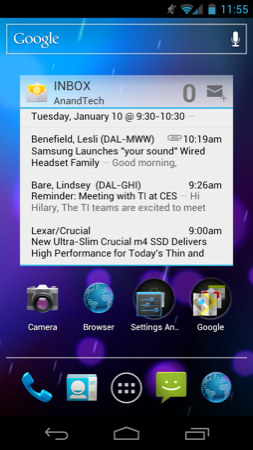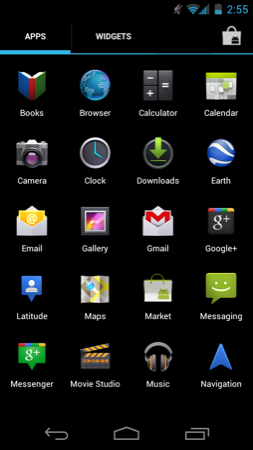Samsung Galaxy Nexus & Ice Cream Sandwich Review
by Brian Klug & Anand Lal Shimpi on January 18, 2012 1:34 PM ESTGoogle employs more than 20,000 people worldwide and the number of them working on Android are in the single digit percentage range. Google's business is search, but it has always had aspirations of more. Android isn't just a chance to capitalize on mobile search for Google, it's also an opportunity to grab power in the next era of personal computing. If you believe that smartphones will eventually replace mainstream PCs, who wouldn't want to be to smartphones what Microsoft was to PCs in the early 1990s?
Previous versions of Android have been cautious, evolutionary steps along a path to being a more open/flexible alternative to iOS. Starting with Honeycomb (Android 3.0) however, Google began to step out of the shadow of its competitors and really start to define Android as a mobile computing platform. Honeycomb was limited to tablets but its successor, Ice Cream Sandwich (Android 4.0), would bring unification to Android across both tablets and smartphones.
Today we look at both ICS and its launch vehicle, Google's Galaxy Nexus.
The Android vs. iOS Debate
It's very clear to me now more than ever that Apple and Google have completely different goals with their mobile OS strategies. Excluding the unclear strategy behind Chrome OS, Android is pretty much Google's primary operating system. The unified tablet/smartphone strategy behind Ice Cream Sandwich makes sense because for Google to succeed in the OS business it needs to deploy Android on everything from smartphones to notebooks. We've already seen the strengths in having a smartphone platform with a strong app ecosystem. Things become even more appealing if you have a phone, tablet and PC that all run the same OS and apps. As Android is Google's one-size-fits-all operating system, it needs to have a broader and slightly more ambitious focus than iOS otherwise it risks losing the race in the long run.
Apple is in a different position. It already has a successful desktop/notebook OS that is continuing to grow. While iOS has been a runaway success for Apple, the Mac OS X platform is a solid option for any user who needs more than their iPhone or iPad can provide. The two OSes may converge or at least borrow heavily from one another, but in the interim they can remain independent. If you need more of a computing experience Apple is happy to sell you a Mac. If you want the it-just-works appliance experience in your phone or tablet, Apple has a whole bunch of iPhone/iPad configurations to offer you.


ICS isn't a step towards iOS. If anything it proves that Google is committed to its own trajectory. Android is an OS that, although more closed than many would like, still allows more flexibility than iOS. You can sideload apps not purchased in the Market. The file system isn't completely hidden from you. You can even override the default zoom level on web pages. Apple and Google both pour tons of time and research into figuring out the best way to do something. And, to be honest, I feel like Apple generally does a better job of "getting it" for the very mainstream consumer. Rather than attempt to make the perfect mold however, Google gives you one that's a bit more flexible.
I've said this before but I do believe that Apple is trying to deliver more of an appliance experience, whereas Google is providing you with a modern take on a traditional computing experience. If the appliance is a smartphone, then both approaches are equally capable - it's just a matter of personal preference.
What's new in ICS really falls into one of three categories:
- Improvements in UI frame rate due to OpenGL ES rendering (non-skia) path
- UI tweaks
- New features
Nowhere in this list is a fundamental change in the way Android works. I feel that this is a very important point to understand and likely the cause for lots of disagreement when it comes to just how impressive (or not) ICS is.
ICS is smoother, more polished and has its own set of new features that make it a significant step forward for Android. What ICS is not however is an outright clone of iOS. If you prefer the iOS experience to Android, ICS will do nothing to change your opinion. If all you were missing from Android was a smoother UI, then its fourth major release should be almost everything you could ask for.










185 Comments
View All Comments
Tujan - Wednesday, January 18, 2012 - link
Concerning the youtube video shown about the android smartphone. No misconception here,but is it the intention of the video to put your thumb so much at the forefront of the small phone,somehow toggling between 'both eyes' of the viewer. ? Is that the intention of the video ?Pure punn intended that is an awesome big speaker you are speaking to. And true even though the video was most likely rendered in 'full part',with both video and audio attached,I cannot help the feeling that there IS SOME LATENCY between my chinese made glasses and the finish of my lcd.
The fact that you are discussing a radio device,and I am utilizing a later viewing of it over a wired internet connection. Does not diminish the fact that your radio devices capability of facial recognition,and my lcds display of it is no substitute for taking x-rays if you actually need to.
I see that you are descript in functioning your arms across the whole of the screen at the making of your video. And there is that very large meter between the preposition of the distance of the audio device,and the radio device that is to conclude that preposition.
Punn accepted there is certainly some latency there that is perfectly conceptual. Between the foreground,and the background. And the autonomic acceptance of my viewing it.
You notice that at times as a forefront,you have a wide screen rendering. Then at other times there is the focus 'in'. The difference in doing so is the focal point of my comment in that subject of its latency.
And that truly the speaking IS a separate distinction of a Microphone. Than that of a speaker,and the screen displayed. Your being behind it shouldn't be misconstrued of what my comment is coordinating to account to. Since obviously the latency between my glasses and what I see on the screen at my viewing of it is of no consequence to your creation of it.
Mentioning that relationally you cannot change the environment around you no more than I can make your video for you. Perhaps someone will recognize this.
And thanks.
nsnsmj - Wednesday, January 18, 2012 - link
I always enjoy how detailed the reviews are.BitGambit - Wednesday, January 18, 2012 - link
I love this phone, but I have owned 2 different Nexii with the "Mura" screen issue. The first one I owned was glaringly obvious, but the second one less so, but it's still there. I was not able to exchange it for the second time, because the defect wasn't apparent enough to warrant an exchange, explains the Verizon employee. It pains me because having a good screen is important to me and I was looking forward to release of the Galaxy Nexus. I'm absolutely jealous of those who have a Galaxy Nexus with immaculate AMOLED screens.crankerchick - Wednesday, January 18, 2012 - link
I haven't had a chance to read the whole review, but I'm happy to see it. I've been checking everyday thinking I must have missed the review. It's great to see time and care being put into the review, as always. The video at the bottom was also very insightful and hits right in the points if why I prefer Android and the evolution it has seen, over iOS when it comes to my mobile devices. ICS flies in my Galaxy Nexus and my XOOM! I don't ever see 25 Mbps on my Nexus though, or all the bars for that matter. Maybe I have a signal issue? :-pflomt - Thursday, January 19, 2012 - link
I see you have the iphone 4s getting 9.85 hours of web browsing. Do you receive a phone from Apple to test, or do you go to the store and buy one?The reason I am asking is I have a 4s and I can tell you mine, and the people I know that have one are lucky to get 9.85 hours of battery life with the phone sitting on the nigh stand.
Thanks for the great reviews.
doobydoo - Thursday, January 19, 2012 - link
I think all the figures Anandtech post are their own measured statistics.I have a 4s and I, and the people I know that have one, are amazed by how long the battery life lasts, both in general and when web browsing.
When sitting on the night stand for 9.85 hours a very small percentage of battery life is depleted.
flomt - Thursday, January 19, 2012 - link
I know 4 other people with a 4s, none of them can last 24 hours with very light usage. 9 hours of web browsing is not even kinda of possible. All are on the most current release 5.0.1Reading the Apple forums, I am not the only one. Do the phones with poor battery life all originate in a different factory than the ones that last a long time? have a different version of the radio?
Apple is just denying that they have a problem now and I can tell you that they really do have a serious problem with some phones.
tipoo - Thursday, January 19, 2012 - link
Are you running push e-mail by any chance? That kills idle battery life.flomt - Thursday, January 19, 2012 - link
Nope, manual sync only.tom5 - Thursday, January 19, 2012 - link
You state in the article here that the camera sensor is a NOT-back-illuminated S5K4E1G sensor and Chipworks in the teardown article states that Galaxy Nexus is using "S5K4E5YA 5 Mp, 1.4 µm pixel pitch back illuminated CMOS image sensor":http://goo.gl/gvIWV
Who is right?